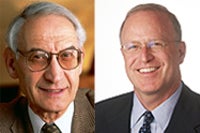In a New York Times op-ed about the challenge to Arizona’s public financing scheme currently pending in the Supreme Court, Harvard Law School Professor Charles Fried and co-author Cliff Sloan ’84 write: “The [Arizona] law simply ensures that, when a candidate relying on private money speaks, the publicly financed candidate has the money to answer.” The op-ed—“Free Speech Worth Paying For”—appeared in the March 25, 2011 edition of NYTimes.com.
Earlier this month, Fried and Sloan joined more than 10 former elected officials in an amici curiae brief filed in support of the respondents in McComish v. Bennett, now pending before the Court.
A renowned constitutional scholar, Fried is the author of many books, including “Modern Liberty and the Limits of Government” (W.W. Norton and Company, 2006) and “Saying What the Law Is: The Constitution in the Supreme Court” (Harvard University Press, 2004). Fried was Solicitor General of the United States, 1985-89, and an Associate Justice of the Supreme Judicial Court of Massachusetts, 1995-99. Sloan, partner at Skadden, Arps, Slate, Meagher, and Flom, has served on the U.S. Court of Appeals for the District of Columbia Circuit’s Advisory Committee on Procedures, and also served as Associate Counsel to the President and Assistant to the Solicitor General. Sloan was publisher of Slate Magazine from 2005-08.
Free Speech Worth Paying For
by Charles Fried and Cliff Sloan
On Monday, the Supreme Court will consider its first campaign-finance challenge since Citizens United v. Federal Election Commission, the 2010 ruling that permits corporations and unions to spend as much as they wish to promote or defeat political candidates. Based on Citizens United, it might appear that the court would be inclined to wipe away all regulation of campaign finance. But that view would be mistaken.
The court will hear a pair of challenges to an Arizona law that provides public financing for candidates who agree to forgo private contributions, including their own. Under the law, adopted in 1998 as a citizen initiative in the wake of election scandals, Arizona allocates additional money to publicly financed candidates when their privately financed opponents spend more than a specified amount.
These challenges are being brought by political action committees and candidates for state office who say that the law violates their free speech rights. But it is the defenders of public financing schemes like Arizona’s who have the First Amendment at their back. And they have Citizens United, with its broad protection for speech in the public square, on their side. … Read full article on NYTimes.com »
